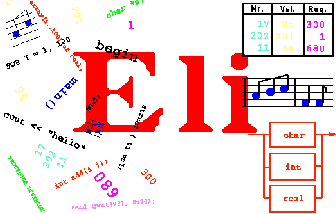Raincode Labs Compiler Coding Dojo

CoCoDo is a coding dojo where you can enjoy an entire day of compiler programming under gentle guidance of field experts.
Due to the cancellation of the ‹Programming› 2020 conference, CoCoDo 2020 did NOT take place in March 2020. We went again in 2021.
grammar Expr; prog: (expr NEWLINE)* ; expr: expr ('*'|'/') expr | expr ('+'|'-') expr | INT | '(' expr ')' ; NEWLINE : [\r\n]+ ; INT : [0-9]+ ;

%% %left RPAREN; %left MULT, DIV; %left PLUS, MINUS; %typeof NUMBER = "Number"; %typeof expr = "Expr"; %% expr = expr.a MULT expr.b {: return new Expr(a.value * b.value); :} | expr.a DIV expr.b {: return new Expr(a.value / b.value); :} | expr.a PLUS expr.b {: return new Expr(a.value + b.value); :} | expr.a MINUS expr.b {: return new Expr(a.value - b.value); :} | NUMBER.n {: return new Expr(n.doubleValue()); :} | LPAREN expr.e RPAREN {: return e; :} ;

%token TYPE DOTDOT ID %left '+' '-' %left '*' '/' %% type_decl: TYPE ID '=' type ';' ; type: '(' id_list ')' | expr DOTDOT expr; id_list: ID | id_list ',' ID; expr: '(' expr ')' | expr '+' expr | expr '-' expr | expr '*' expr | expr '/' expr | ID;

Abstract data Arith = Add Arith Arith | Sub Arith Arith | Mul Arith Arith | Div Arith Arith | Num Natural | Var String deriving (Show, Eq, Read) Concrete Expr -> Expr '+' Term | Expr '-' Term | Term ; Term -> Term '*' Factor | Term '/' Factor | Factor ; Factor -> '-' Factor | Int | Name | '(' Expr ')' ; Actions Arith +> Expr Add x y +> (x +> Expr) '+' (y +> Term); Sub x y +> (x +> Expr) '-' (y +> Term); exp +> (exp +> Term); Arith +> Term Mul x y +> (x +> Term) '*' (y +> Factor); Div x y +> (x +> Term) '/' (y +> Factor); exp +> (exp +> Factor); Arith +> Factor Sub (Num 0) y +> '-' (y +> Factor); Num i +> (i +> Int); Var n +> (n +> Name); exp +> '(' (exp +> Expr) ')';
%left LO '+' '-' %left HI '*' '/' '%' %nonassoc UNARY %% expr: expr op1 expr %prec LO | expr op2 expr %prec HI | unary expr %prec UNARY ; op1 : '+' | '-' ; op2 : '*' | '/' | '%' ; unary : '+' | '-' | '*' | '&' ;
%left '+' '-' %left '*' '/' %% expr : expr '+' expr | expr '-' expr | expr '*' expr | expr '/' expr | '-' expr %prec '*' | NAME ;
 Berkeley Yacc Java extension
Berkeley Yacc Java extension%{ import java.lang.Math; import java.io.*; import java.util.StringTokenizer; %} /* YACC Declarations */ %token NUM %left '-' '+' %left '*' '/' %left NEG /* negation--unary minus */ %right '^' /* exponentiation */ /* Grammar follows */ %% input: /* empty string */ | input line ; line: '\n' | exp '\n' { System.out.println(" " + $1.dval + " "); } ; exp: NUM { $$ = $1; } | exp '+' exp { $$ = new ParserVal($1.dval + $3.dval); } | exp '-' exp { $$ = new ParserVal($1.dval - $3.dval); } | exp '*' exp { $$ = new ParserVal($1.dval * $3.dval); } | exp '/' exp { $$ = new ParserVal($1.dval / $3.dval); } | '-' exp %prec NEG { $$ = new ParserVal(-$2.dval); } | exp '^' exp { $$ = new ParserVal(Math.pow($1.dval, $3.dval)); } | '(' exp ')' { $$ = $2; } ; %% String ins; StringTokenizer st; void yyerror(String s) { System.out.println("par:"+s); } boolean newline; int yylex() { String s; int tok; Double d; if (!st.hasMoreTokens()) if (!newline) { newline=true; return '\n'; } else return 0; s = st.nextToken(); try { d = Double.valueOf(s); yylval = new ParserVal(d.doubleValue()); tok = NUM; } catch (Exception e) { tok = s.charAt(0); } return tok; } void dotest() { BufferedReader in = new BufferedReader(new InputStreamReader(System.in)); while (true) { System.out.print("expression:"); try { ins = in.readLine(); } catch (Exception e) {} st = new StringTokenizer(ins); newline=false; yyparse(); } } public static void main(String args[]) { Parser par = new Parser(false); par.dotest(); }
COMPILER Sample CHARACTERS digit = '0'..'9'. TOKENS number = digit {digit}. IGNORE '\r' + '\n' PRODUCTIONS Sample (. int n; .) = { "calc" Expr<out n> (. Console.WriteLine(n); .) }. Expr<out int n> (. int n1; .) = Term<out n> { '+' Term<out n1> (. n = n + n1; .) }. Term<out int n> = number (. n = Convert.Int32(t.val); .) . END Sample.
%cf{ non terminal stmt; non terminal Double stmts,expr; start with stmts; precedence left PLUS, BINARY_MINUS; precedence left TIMES, DIVIDE; precedence left UNARY_MINUS; stmts ::= stmts:hd stmt:tl {: RESULT = (env.containsKey("RESULT") ? env.get("RESULT") : 0.0/0.0); :} | stmt:s {: RESULT = (env.containsKey("RESULT") ? env.get("RESULT") : 0.0/0.0); :} ; stmt ::= UNASSIGNED_ID:i ASSIGN expr:e SEMI {: env.put(i,e); :} | expr:e SEMI {: env.put("_e" + (nextUnnamed++),e); :} ; expr ::= expr:l PLUS expr:r {: RESULT = l + r; :} | expr:l BINARY_MINUS expr:r {: RESULT = l - r; :} | expr:l TIMES expr:r {: RESULT = l * r; :} | expr:l DIVIDE expr:r {: RESULT = l / r; :} | UNARY_MINUS expr:e {: RESULT = -1.0 * e; :} %layout () | LPAREN expr:e RPAREN {: RESULT = e; :} | NUMBER:n {: RESULT = n; :} | ASSIGNED_ID:i {: RESULT = i; :} | UNASSIGNED_ID:u {: error(_pos,"Undefined symbol '" + u + "'"); RESULT = 0.0/0.0; :} ; %cf}
expr(E) --> lassoc(ops,atom,binary,E). expr(apply(N,Es)) --> name(N), +(atom,Es). expr(ifThenElse(E1,E2,E3)) --> reserved("if"), expr(E1), reserved("then"), expr(E2), reserved("else"), expr(E3).

ClassDeclaration: Modifiers 'class' Identifier Super Interfaces ClassBody . Super: 'extends' InhName / . Interfaces: ['implements' InterfaceTypeList] . InterfaceTypeList: InterfaceType / InterfaceTypeList ',' InterfaceType . ClassBody: '{' ClassBodyDeclarations '}' . ClassBodyDeclarations: / ClassBodyDeclarationList . ClassBodyDeclarationList: ClassBodyDeclaration / ClassBodyDeclarationList ClassBodyDeclaration .

start G G ::= [Grammar] "start" start:</rules[it]> rules:R* R ::= [Rule] name:sym "::=" arg:A A ::= [Alt] alts:C + @"|" C ::= [Create] "[" name:sym "]" arg:S | S S ::= [Sequence] elements:F* F ::= [Field] name:sym ":" arg:P | P P ::= [Lit] value:str | [Value] kind:("int" | "str" | "real" | "sym") | [Ref] "<" path:Path ">" | [Call] rule:</rules[it]> | [Code] "{" code:Expr "}" | [Regular] arg:P "*" Sep? { optional && many } | [Regular] arg:P "?" { optional } | "(" A ")" Sep ::= "@"sep:P

import Char data Expr = Ident Char | Apply Expr Expr deriving (Show) type Terminal = Char %{ Terminal = guard {isAlpha} as "letter" | '(' | ')'; Nonterminal = expr {Expr}; expr {Ident x} : "letter" {x}; {Apply t u} | expr {t}, '(', expr {u}, ')'; }% frown ts = fail "syntax error"
specification : rule+; rule : ident ":" disjunction ";"; disjunction : {conjunction "|"}; conjunction : term+; term : basis repetition?; basis : ident | literal | "%epsilon" | alternation | group ; repetition : "+" | "*" | "?"; alternation : "{" basis basis "}" repetition; group : "(" disjunction ")" ;
 GOLD Parsing System
GOLD Parsing SystemId = {Letter}{AlphaNumeric}* <Statement> ::= if Id then <Statement> | if Id then <Then Stm> else <Statement> | Id ':=' Id <Then Stm> ::= if Id then <Then Stm> else <Then Stm> | Id ':=' Id

Exp : let var '=' Exp in Exp { Let $2 $4 $6 } | Exp1 { Exp1 $1 } Exp1 : Exp1 '+' Term { Plus $1 $3 } | Exp1 '-' Term { Minus $1 $3 } | Term { Term $1 } Term : Term '*' Factor { Times $1 $3 } | Term '/' Factor { Div $1 $3 } | Factor { Factor $1 } Factor : int { Int $1 } | var { Var $1 } | '(' Exp ')' { Brack $2 }

Start ::= Element Element ::= s=STag Content ETag(s) STag ::= '<' n:Name Attribute* '>' {n.yield} ETag(s) ::= '</' n:Name [n.yield == s] '>' Attribute ::= Name "=" String Content ::= Element* | Text @Layout L ::= Whitespaces regex { Name ::= [a-zA-Z][a-zA-Z0-9]* Text ::= [a-zA-Z0-9]+ String ::= '\"' [a-zA-Z0-9]+ '\"' Whitespaces ::= [\n\r\t\f\ ]* }

Expr.Rule = Term | UnExpr | BinExpr | PostFixExpr; Term.Rule = number | ParExpr | identifier; ParExpr.Rule = "(" + Expr + ")"; UnExpr.Rule = UnOp + Term; UnOp.Rule = ToTerm("+") | "-" | "++" | "--"; BinExpr.Rule = Expr + BinOp + Expr; BinOp.Rule = ToTerm("+") | "-" | "*" | "/" | "**"; PostFixExpr.Rule = Term + PostFixOp; PostFixOp.Rule = ToTerm("++") | "--"; AssignmentStmt.Rule = identifier + AssignmentOp + Expr; AssignmentOp.Rule = ToTerm("=") | "+=" | "-=" | "*=" | "/="; Statement.Rule = AssignmentStmt | Expr | Empty; ProgramLine.Rule = Statement + NewLine; Program.Rule = MakeStarRule(Program, ProgramLine); this.Root = Program; RegisterOperators(1, "+", "-"); RegisterOperators(2, "*", "/"); RegisterOperators(3, Associativity.Right, "**");

Program ::= Block /PredefinedType:TypeDecl*/; Block ::= BlockStmt*; abstract BlockStmt; abstract Stmt: BlockStmt; abstract Decl: BlockStmt ::= <Name:String>; abstract TypeDecl:Decl; ClassDecl: TypeDecl ::= [Superclass:IdUse] Body:Block; VarDecl: Decl ::= Type:Access; AssignStmt: Stmt ::= Variable:Access Value:Exp; WhileStmt: Stmt ::= Condition:Exp Body:Stmt; abstract Exp; abstract Access:Exp; abstract IdUse: Access ::= <Name:String>; Use: IdUse; Dot:Access ::= ObjectReference:Access IdUse; BooleanLiteral : Exp ::= <Value:String>;

double Primary() throws NumberFormatException : { Token t ; double d ; } { t=<NUMBER> { return Double.parseDouble( t.image ) ; } | <PREVIOUS> { return previousValue ; } | <OPEN_PAR> d=Expression() <CLOSE_PAR> { return d ; } | <MINUS> d=Primary() { return -d ; } }
Terminals operators = Terminals.operators(","); // only one operator supported so far Parser<?> integerTokenizer = Terminals.IntegerLiteral.TOKENIZER; Parser<String> integerSyntacticParser = Terminals.IntegerLiteral.PARSER; Parser<?> ignored = Parsers.or(Scanners.JAVA_BLOCK_COMMENT, Scanners.WHITESPACES); Parser<?> tokenizer = Parsers.or(operators.tokenizer(), integerTokenizer); // tokenizes the operators and integer Parser<List<String>> integers = integerSyntacticParser.sepBy(operators.token(",")) .from(tokenizer, ignored.skipMany()); assertEquals(Arrays.asList("1", "2", "3"), integers.parse("1, /*this is comment*/2, 3");

class SyntaxAnalyser(positions : Positions) extends Parsers(positions) { lazy val stmt : Parser[Stmt] = ";" ^^ (_ => Null()) | sequence | asgnStmt | whileStmt lazy val asgnStmt = variable ~ ("=" ~> exp) <~ ";" ^^ Asgn lazy val whileStmt = ("while" ~> "(" ~> exp <~ ")") ~ stmt ^^ While lazy val sequence = "{" ~> (stmt*) <~ "}" ^^ Seqn lazy val exp : PackratParser[Exp] = exp ~ ("+" ~> term) ^^ Add | exp ~ ("-" ~> term) ^^ Sub | term lazy val term : PackratParser[Exp] = term ~ ("*" ~> factor) ^^ Mul | term ~ ("/" ~> factor) ^^ Div | factor lazy val factor : Parser[Exp] = double | integer | variable | "-" ~> exp ^^ Neg | "(" ~> exp <~ ")" lazy val double = """[0-9]+\.[0-9]+""".r ^^ (s => Num(s.toDouble)) lazy val integer = "[0-9]+".r ^^ (s => Num(s.toInt)) lazy val variable = idn ^^ Var lazy val idn = not(keyword) ~> "[a-zA-Z][a-zA-Z0-9]*".r lazy val keyword = keywords("[^a-zA-Z0-9]".r, List("while")) }

main := (num /[^0-9]/ | other)* num := digit{1,3} ("," digit{3})* digit := /[0-9]/ other := /./
GRAMMARSTRING ="""
Value :: ## indicates Value is the root nonterminal for the grammar
@R SetqRule :: Value >> ( setq var Value )
@R ListRule :: Value >> ( ListTail
@R TailFull :: ListTail >> Value ListTail
@R TailEmpty :: ListTail >> )
@R Varrule :: Value >> var
@R Intrule :: Value >> int
@R Strrule :: Value >> str
@R PrintRule :: Value >> ( print Value )
"""
grammar example { digit = "5"; example = digit; Example example; example.setDigit(String digit); }
Grammar <- Spacing Definition+ EndOfFile Definition <- Identifier LEFTARROW Expression Expression <- Sequence (SLASH Sequence)* Sequence <- Prefix* Prefix <- (AND / NOT)? Suffix Suffix <- Primary (QUESTION / STAR / PLUS)? Primary <- Identifier !LEFTARROW / OPEN Expression CLOSE / Literal / DOT Identifier <- '[a-zA-Z_][a-zA-Z_0-9]*' Spacing Literal <- "'" (!"'" Char)* "'" Spacing / '"' (!'"' Char)* '"' Spacing Char <- '\\[nrt\'"\+\-\*\.\?\^\$\{\}\(\)\[\]\\]' / '\\[0-2][0-7][0-7]' / '\\[0-7][0-7]?' / !'\\' .
 MetaEdit+
MetaEdit+fun lookup "bogus" = 10000 | lookup s = 0 %% %eop EOF SEMI %pos int %left SUB PLUS %left TIMES DIV %right CARAT %term ID of string | NUM of int | PLUS | TIMES | PRINT | SEMI | EOF | CARAT | DIV | SUB %nonterm EXP of int | START of int option %name Calc %subst PRINT for ID %prefer PLUS TIMES DIV SUB %keyword PRINT SEMI %noshift EOF %value ID ("bogus") %nodefault %verbose %% START : PRINT EXP (print EXP; print "\n"; flush_out std_out; SOME EXP) | EXP (SOME EXP) | (NONE) EXP : NUM (NUM) | ID (lookup ID) | EXP PLUS EXP (EXP1+EXP2) | EXP TIMES EXP (EXP1*EXP2) | EXP DIV EXP (EXP1 div EXP2) | EXP SUB EXP (EXP1-EXP2) | EXP CARAT EXP (let fun e (m,0) = 1 | e (m,l) = m*e(m,l-1) in e (EXP1,EXP2) end)
MethodDeclaration
= MethodModifier* MethodHeader MethodBody ;
MethodHeader
= Result MethodDeclarator Throws?
/ TypeParameters Annotation* Result MethodDeclarator Throws?
;
MethodDeclarator
= Identifier LPAR FormalParameterList? RPAR Dim* ;
FormalParameterList
= (ReceiverParameter / FormalParameter)(COMMA FormalParameter)* ;
FormalParameter
= VariableModifier* UnannType VariableDeclaratorId
/ VariableModifier* UnannType Annotation* ELLIPSIS VariableDeclaratorId !COMMA
;
VariableModifier
= Annotation
/ FINAL
;
ReceiverParameter
= VariableModifier* UnannType (Identifier DOT)? THIS ;
Result
= UnannType
/ VOID
;
MethodModifier
= Annotation
/ PUBLIC
/ PROTECTED
/ PRIVATE
/ ABSTRACT
/ STATIC
/ FINAL
/ SYNCHRONIZED
/ NATIVE
/ STRICTFP
;
Throws
= THROWS ExceptionTypeList ;
ExceptionTypeList
= ExceptionType (COMMA ExceptionType)* ;
ExceptionType
= ClassType
/ TypeVariable
;
MethodBody
= Block
/ SEMI
;
import org.parboiled.scala._ class SimpleCalculator extends Parser { def Expression: Rule0 = rule { Term ~ zeroOrMore(anyOf("+-") ~ Term) } def Term = rule { Factor ~ zeroOrMore(anyOf("*/") ~ Factor) } def Factor = rule { Number | "(" ~ Expression ~ ")" } def Number = rule { oneOrMore("0" - "9") } }

import ParsecExpr expr :: Parser Integer expr = buildExpressionParser table factor <?> "expression" table = [[op "*" (*) AssocLeft, op "/" div AssocLeft] ,[op "+" (+) AssocLeft, op "-" (-) AssocLeft] ] where op s f assoc = Infix (do{ string s; return f}) assoc factor = do{ char '(' ; x <- expr ; char ')' ; return x } <|> number <?> "simple expression" number :: Parser Integer number = do{ ds <- many1 digit ; return (read ds) } <?> "number"
exprparser :: Parser Expr exprparser = buildExpressionParser table term <?> "expression" table = [ [Prefix (m_reservedOp "~" >> return (Uno Not))] , [Infix (m_reservedOp "&" >> return (Duo And)) AssocLeft] , [Infix (m_reservedOp "=" >> return (Duo Iff)) AssocLeft] ] term = m_parens exprparser <|> fmap Var m_identifier <|> (m_reserved "true" >> return (Con True)) <|> (m_reserved "false" >> return (Con False))
double multiply(double x, double y) { return x*y; } double add(double x, double y) { return x+y; } double subtract(double x, double y) { return x-y; } double divide(double x, double y) { return x/y; } typedef Parser<string, double>::type NumParser; NumParser ops = op_table(real) ->infix_left("+", 10, add) ->infix_left("-", 10, subtract) ->infix_left("*", 20, multiply) ->infix_left("/", 20, divide); ParseResult<double> result; result = parse("3+4*2", ops); if (result.parse_finished()) { std::cout << parse.data(); }

identifier := (#letter asParser , (#letter asParser / #digit asParser) star) flatten. number := #digit asParser plus token trim ==> [ :token | token value asNumber ]. term := PPUnresolvedParser new. prod := PPUnresolvedParser new. prim := PPUnresolvedParser new. term def: (prod , $+ asParser trim , term ==> [ :nodes | nodes first + nodes last ]) / prod. prod def: (prim , $* asParser trim , prod ==> [ :nodes | nodes first * nodes last ]) / prim. prim def: ($( asParser trim , term , $) asParser trim ==> [ :nodes | nodes second ]) / number. start := term end.
names = { }
def p_statement_assign(t):
'statement : NAME EQUALS expression'
names[t[1]] = t[3]
def p_statement_expr(t):
'statement : expression'
print(t[1])
def p_expression_binop(t):
'''expression : expression PLUS expression
| expression MINUS expression
| expression TIMES expression
| expression DIVIDE expression'''
if t[2] == '+' : t[0] = t[1] + t[3]
elif t[2] == '-': t[0] = t[1] - t[3]
elif t[2] == '*': t[0] = t[1] * t[3]
elif t[2] == '/': t[0] = t[1] / t[3]
def p_expression_uminus(t):
'expression : MINUS expression %prec UMINUS'
t[0] = -t[2]
def p_expression_group(t):
'expression : LPAREN expression RPAREN'
t[0] = t[2]
def p_expression_number(t):
'expression : NUMBER'
t[0] = t[1]
def p_expression_name(t):
'expression : NAME'
try:
t[0] = names[t[1]]
except LookupError:
print("Undefined name '%s'" % t[1])
t[0] = 0 PREttier Compiler-Compiler
PREttier Compiler-Compilerinteger = [ <'+'>|<'-'> ] unsigned_int [ {<'E'>|<'e'>} [<'+'>] unsigned_int ] unsigned_int = (isdigit)+
def on_exp(self, target, option, names, values): """ exp : NUMBER | exp PLUS exp | exp MINUS exp | exp TIMES exp | exp DIVIDE exp | MINUS exp %prec NEG | exp POW exp | LPAREN exp RPAREN """ if option == 0: return float(values[0]) elif option == 1: return values[0] + values[2] elif option == 2: return values[0] - values[2] elif option == 3: return values[0] * values[2] elif option == 4: return values[0] / values[2] elif option == 5: return - values[1] elif option == 6: return values[0] ** values[2] elif option == 7: return values[1]
_class SimpleMathParser _lex mathlex.mathlex() _code from PyLR.Lexers import mathlex """ expression: expression PLUS term (addfunc) | term; term: term TIMES factor (timesfunc) | factor; factor: LPAREN expression RPAREN (parenfunc) | INT; """
from pyparsing import Word, alphas greet = Word( alphas ) + "," + Word( alphas ) + "!" hello = "Hello, World!" print (hello, "->", greet.parseString( hello ))
from Pysec import Parser, choice, quoted_chars, group_chars, option_chars, digits, between, pair, spaces, match, quoted_collection json_choices = [] json = choice(json_choices) text = quoted_chars("'", "'") number = group_chars([option_chars(["-"]), digits, option_chars([".", digits])]) >> Parser.lift(float) joiner = between(spaces, match(","), spaces) mapping_pair = pair(text, spaces & match(":") & spaces & json) collection = quoted_collection("[", spaces, json, joiner, "]") >> Parser.lift(list) mapping = quoted_collection("{", spaces, mapping_pair, joiner, "}") >> Parser.lift(dict) json_choices.extend([text, number, mapping, collection]) print json.parseString("{'a' : -1.0, 'b' : 2.0, 'z' : {'c' : [1.0, [2.0, [3.0]]]}}")

(define simple-math-lexer (lexer ("-" (token--)) ("+" (token-+)) ("let" (token-LET)) ("in" (token-IN)) ((re-+ number10) (token-NUM (string->number lexeme))) (identifier (token-VAR lexeme)) ;; recursively calls the lexer which effectively skips whitespace (whitespace (simple-math-lexer input-port)) ((eof) (token-EOF)))) (define simple-math-parser (parser (start exp) (end EOF) (error void) (tokens a b) (precs (left - +)) (grammar (exp ((LET VAR NUM IN exp) (make-let-exp $2 (num-exp $3) $5)) ((NUM) (num-exp $1)) ((VAR) (var-exp $1)) ((exp + exp) (make-arith-exp + $1 $3)) ((exp - exp) (make-arith-exp - $1 $3))))))
action dgt { printf("DGT: %c\n", fc); } action dec { printf("DEC: .\n"); } action exp { printf("EXP: %c\n", fc); } action exp_sign { printf("SGN: %c\n", fc); } action number { /*NUMBER*/ } number = ( [0-9]+ $dgt ( '.' @dec [0-9]+ $dgt )? ( [eE] ( [+\-] $exp_sign )? [0-9]+ $exp )? ) %number; main := ( number '\n' )*;

start syntax Program = program: "begin" Declarations decls {Statement ";"}* body "end" ; syntax Declarations = "declare" {IdType ","}* decls ";" ; syntax IdType = idtype: Id id ":" Type t; syntax Statement = assign: Id var ":=" Expression val | cond: "if" Expression cond "then" {Statement ";"}* thenPart "else" {Statement ";"}* elsePart "fi" | cond: "if" Expression cond "then" {Statement ";"}* thenPart "fi" | loop: "while" Expression cond "do" {Statement ";"}* body "od" ; syntax Type = natural:"natural" | string :"string" | nil :"nil-type" ; syntax Expression = id: Id name | strcon: String string | natcon: Natural natcon | bracket "(" Expression e ")" > left concat: Expression lhs "||" Expression rhs > left ( add: Expression lhs "+" Expression rhs | min: Expression lhs "-" Expression rhs ) ; lexical Id = [a-z][a-z0-9]* !>> [a-z0-9]; lexical Natural = [0-9]+ ; lexical String = "\"" ![\"]* "\""; layout Layout = WhitespaceAndComment* !>> [\ \t\n\r%]; lexical WhitespaceAndComment = [\ \t\n\r] | @category="Comment" "%" ![%]+ "%" | @category="Comment" "%%" ![\n]* $ ; public start[Program] program(str s) { return parse(#start[Program], s); } public start[Program] program(str s, loc l) { return parse(#start[Program], s, l); }
parser = Parse::RecDescent->new(q{ <autoaction: { [@item] } > expression: and_expr '||' expression | and_expr and_expr: not_expr '&&' and_expr | not_expr not_expr: '!' brack_expr | brack_expr brack_expr: '(' expression ')' | identifier identifier: /[a-z]+/i });

Grammar expression; Lexer num = digit+; digit = '0'..'9'; blanks = (' ' | eol | tab)+; eol = cr | lf | cr lf; cr = #13; lf = #10; tab = #9; Parser Ignored blanks; program = exp ';'; exp = {mul:} exp [op:]'*' exp | {add:} exp [op:]'+' exp | {num:} num; Precedence Left mul; Left add;
nonterminal Root_c ; synthesized attribute pp :: String ; synthesized attribute ast_Root :: Root; attribute pp, ast_Root occurs on Root_c ; concrete production root_c r::Root_c ::= e::Expr_c { r.pp = e.pp; r.ast_Root = root(e.ast_Expr); } synthesized attribute ast_Expr :: Expr ; nonterminal Expr_c with pp, ast_Expr; nonterminal Term_c with pp, ast_Expr; nonterminal Factor_c with pp, ast_Expr; concrete production add_c sum::Expr_c ::= e::Expr_c ’+’ t::Term_c { sum.pp = e.pp ++ " + " ++ t.pp ; sum.ast_Expr = add(e.ast_Expr, t.ast_Expr ); } concrete production exprTerm_c e::Expr_c ::= t::Term_c { e.pp = t.pp ; e.ast_Expr = t.ast_Expr ; } concrete production mul_c prd::Term_c ::= t::Term_c ’*’ f::Factor_c { prd.pp = t.pp ++ " * " ++ f.pp ; prd.ast_Expr = mul(t.ast_Expr, f.ast_Expr); } concrete production termFactor_c t::Term_c ::= f::Factor_c { t.pp = f.pp ; t.ast_Expr = f.ast_Expr ; } concrete production integerConstant_c ic::Factor_c ::= i::IntLit_t { ic.pp = i.lexeme ; ic.ast_Expr = integerConstant(i); }
declaration = r'''# note use of raw string when embedding in python code... file := [ \t\n]*, section+ section := '[', identifier!, ']'!, ts, '\n', body body := statement* statement := (ts, semicolon_comment) / equality / nullline nullline := ts, '\n' comment := -'\n'* equality := ts, identifier, ts, '=', ts, identified, ts, '\n' identifier := [a-zA-Z], [a-zA-Z0-9_]* identified := string / number / identifier ts := [ \t]* '''
import ro.infoiasi.donald.compiler.parser0.runtime.*; terminal SEMI, PLUS, MINUS, TIMES, DIVIDE, LPAREN, RPAREN; terminal Integer NUMBER, ID; non terminal Object expr_list, expr_part; non terminal Integer expr, factor, term; expr_list ::= expr_list expr_part | expr_part; expr_part ::= expr:e {: System.out.println(" = " + e); :} SEMI; expr ::= factor:f PLUS expr:e {: RESULT = new Integer(f.intValue() + e.intValue()); :} | factor:f MINUS expr:e {: RESULT = new Integer(f.intValue() - e.intValue()); :} | factor:f {: RESULT = new Integer(f.intValue()); :}; factor ::= factor:f TIMES term:t {: RESULT = new Integer(f.intValue() * t.intValue()); :} | factor:f DIVIDE term:t {: RESULT = new Integer(f.intValue() / t.intValue()); :} | term:t {: RESULT = new Integer(t.intValue()); :}; term ::= LPAREN expr:e RPAREN {: RESULT = e; :} | NUMBER:n {: RESULT = n; :} | ID:i {: RESULT = i; :};
<number> : [0-9]+ (\. [0-9]*) ? ; <whitespace> : \s+; %left "+" "-"; %left "*" "/"; %right "^"; Expression : Expression 'exp1' "+" Expression 'exp2' {exp1 + exp2} | Expression 'exp1' "-" Expression 'exp2' {exp1 - exp2} | Expression 'exp1' "*" Expression 'exp2' {exp1 * exp2} | Expression 'exp1' "/" Expression 'exp2' {exp1 / exp2} | Expression 'exp1' "^" Expression 'exp2' {exp1 raisedTo: exp2} | "(" Expression 'expression' ")" {expression} | Number 'number' {number} ; Number : <number> 'numberToken' {numberToken value asNumber} ;
class ExprParser(GenericParser): def __init__(self, start='expr'): GenericParser.__init__(self, start) def p_rules(self args): ''' expr ::= expr + term expr ::= term term ::= term * factor term ::= factor factor ::= number factor ::= float '''

#include <string> #include <iostream> #include <boost/spirit/include/qi.hpp> #include <boost/spirit/include/phoenix.hpp> int main() { namespace qi = boost::spirit::qi; std::string input; std::cout << "Input a line: \n"; getline(std::cin, input); std::cout << "Got '" << input << "'.\n"; unsigned count = 0; auto rule = *(qi::lit("cat") [ ++qi::_val ] | qi::omit[qi::char_]); qi::parse(input.begin(), input.end(), rule, count); std::cout << "The input contained " << count << " occurrences of 'cat'\n"; }
module Pascal context-free start-symbols Program context-free syntax Program.Program = < <Programheading> <Block>. > Programheading.ProgramHeading = < program <Identifier> (<{Identifier ", "}*>); > {case-insensitive} Block.Block = < <LabelDeclarations?> <ConstantDefinitions?> <TypeDefinitions?> <VariableDeclarations?> <{ProcedureOrFunctionDeclaration "\n\n"}*> begin <{Statement ";\n"}*> <Term?> end > {case-insensitive} LabelDeclarations.LabelDecls = < label <{Label ", "}+>; > {case-insensitive} ConstantDefinitions.ConstDefs = < const <{ConstantDefinition "\n"}+> > {case-insensitive} ConstantDefinition.ConstDef = <<Identifier> = <Constant>;> TypeDefinitions.TypeDefs = < type <{TypeDefinition "\n"}+> > {case-insensitive} TypeDefinition.TypeDef = <<Identifier> = <Type>;> VariableDeclarations.VarDecls = < var <{VariableDeclaration "\n"}+> > {case-insensitive} VariableDeclaration.VarDecl = <<{VariableIdentifier ", "}+> : <Type>;> VariableIdentifier.VarId = <<Identifier>> ...

let noneOf = StringParser.noneOf let quotedChars = noneOf("\"") <|> StringParser.string("\"\"").attempt *> GenericParser(result: "\"") let character = StringParser.character let quote = character("\"") let quotedField = quote *> quotedChars.many.stringValue <* (quote <?> "quote at end of field") let field = quotedField <|> noneOf("\r\n,\n\r").many.stringValue let record = field.separatedBy(character(",")) let endOfLine = StringParser.crlf.attempt <|> (character("\n") *> character("\r")).attempt <|> character("\n") <|> character("\r") <?> "end of line" let csv = record.separatedBy(endOfLine)
expr : expr PLUS term | term ; term : ID | NUM | expr OPENP expr CLOSEP; ID: [a-zA-Z] [a-zA-Z0-9]*; NUM: [0-9]+; PLUS: '+'; OPENP: '('; CLOSEP: ')'; WS skip: ' '*;

define program [compilation_unit] end define define compilation_unit [definition_module] | [opt 'IMPLEMENTATION] [program_module] end define define definition_module [NL] DEFINITION MODULE [id] ; [NL][NL] [repeat import_] [repeat definition] END [id] . [NL] end define define program_module MODULE [id] [opt priority] ; [NL][NL] [repeat import_] [block] [id] . end define

calc <- ws sum sum <- prod *([+-] ws prod) prod <- unary *([*/] ws unary) unary <= '-' ws unary | :'(' ws sum :')' ws | num num <- +[0-9] ?('.' +[0-9]) ws ws <: *[ \t\n\r]

import norswap.autumn.Grammar import norswap.autumn.parsers.* class RegexGrammar: Grammar() { fun meta_char() = char_set("|*+?()\\") fun regular_char() = seq { not { meta_char() } && char_any() } fun quoted_char() = seq { string("\\") && char_any() } fun character() = choice { quoted_char() || regular_char() } fun paren_group(): Boolean = seq { string("(") && alternation() && string(")") } fun atom() = choice { paren_group() || character() } fun repetition_char() = char_set("*+?") fun repetition() = seq { atom() && repeat0 { repetition_char() } } fun concatenation() = repeat1 { repetition() } fun alternation() = around1 ({ concatenation() } , { string("|") }) override fun root() = alternation() }
 Whole Platform
Whole PlatformModule <- Spacing Intro Production* EOF Intro <- ModuleDecl Dependency* Header? Body? Footer? Option? ModuleDecl <- "module" FSpacing ModuleRef SEMICOLON Dependency <- Modification / Instantiation / Import Modification <- "modify" FSpacing ModuleRef ModuleTarget? SEMICOLON Instantiation <- "instantiate" FSpacing ModuleRef ModuleTarget? SEMICOLON Import <- "import" FSpacing ModuleRef ModuleTarget? SEMICOLON ModuleRef <- QName ModuleParams? ModuleParams <- OPEN ( QName (COMMA QName)* )? CLOSE ModuleTarget <- "as" FSpacing QName Header <- "header" Spacing Action Body <- "body" Spacing Action Footer <- "footer" Spacing Action Option <- "option" FSpacing Attribute (COMMA Attribute)* SEMICOLON Production <- Full / Addition / Removal / Override Full <- PAttributes QName Identifier EQUAL Choice SEMICOLON Addition <- QName Identifier PLUSEQUAL ( SName ELLIPSIS SLASH Choice SEMICOLON / Choice SLASH SName ELLIPSIS SEMICOLON ) Removal <- QName Identifier MINUSEQUAL SName ( COMMA SName )* SEMICOLON Override <- QName Identifier COLONEQUAL Choice SEMICOLON / QName Identifier COLONEQUAL ELLIPSIS SLASH Choice SEMICOLON / QName Identifier COLONEQUAL Choice SLASH ELLIPSIS SEMICOLON / PAttributes QName Identifier COLONEQUAL ELLIPSIS SEMICOLON

grammar org.example.domainmodel.Domainmodel with org.eclipse.xtext.common.Terminals generate domainmodel "http://www.example.org/domainmodel/Domainmodel" Domainmodel : (elements+=Type)*; Type: DataType | Entity; DataType: 'datatype' name=ID; Entity: 'entity' name=ID ('extends' superType=[Entity])? '{' (features+=Feature)* '}'; Feature: (many?='many')? name=ID ':' type=[Type];
%left '+' '-' %left '*' '/' %% expr : expr '+' expr | expr '-' expr | expr '*' expr | expr '/' expr | '-' expr %prec '*' | NAME ;
parser Calculator: option: "context-insensitive-scanner" token END: "$" token NUM: "[0-9]+" rule goal: expr END -> << expr >> rule expr: factor expr_tail<<factor>> -> << expr_tail >> rule expr_tail<<v>>: -> << v >> | "+" factor expr_tail<<v+factor>> -> << expr_tail >> | "-" factor expr_tail<<v-factor>> -> << expr_tail >> rule factor: term factor_tail<<term>> -> << factor_tail >> rule factor_tail<<v>>: -> << v >> | "*" term factor_tail<<v*term>> -> << factor_tail >> | "/" term factor_tail<<v/term>> -> << factor_tail >> rule term: NUM -> << atoi(NUM) >> | "(" expr ")" -> << expr >>
 The page is maintained by Dr. Vadim Zaytsev a.k.a. @grammarware, ex-CSO of Raincode Labs, Professor of Software Evolution at the University of Twente.
The page is maintained by Dr. Vadim Zaytsev a.k.a. @grammarware, ex-CSO of Raincode Labs, Professor of Software Evolution at the University of Twente.